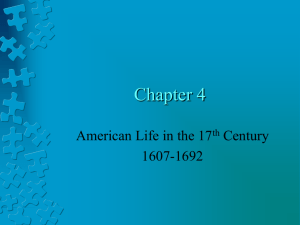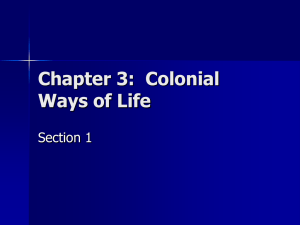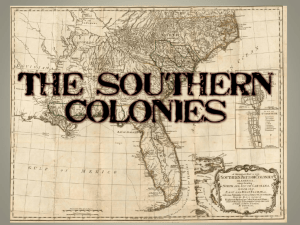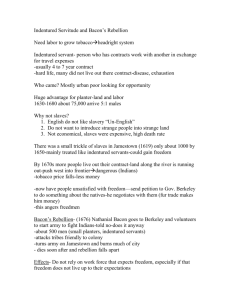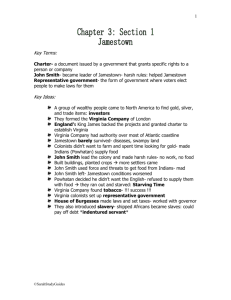joint-stock company.
advertisement
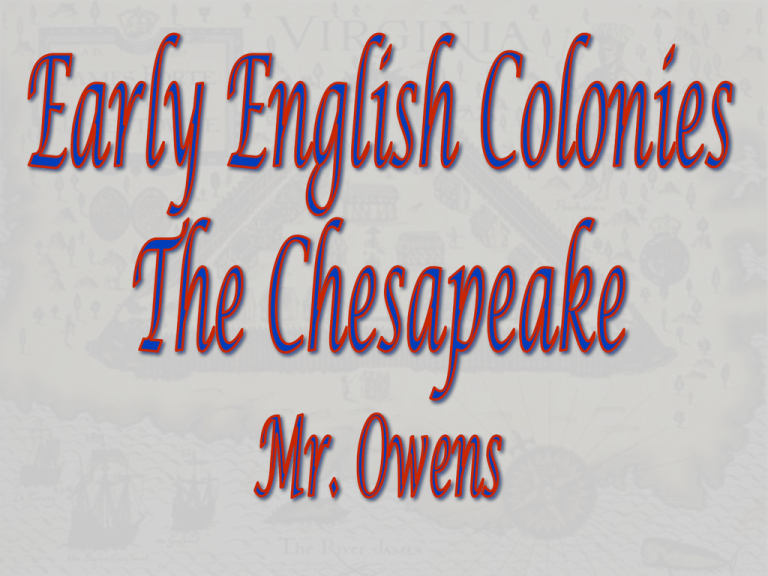
Essential Questions: • What caused the labor system of the Chesapeake and southern colonies to evolve from indentured servitude to slavery? • What caused the significant contrast between different British colonies in America? Jamestown & Virginia • 1606 - James I issues a corporate charter to the Virginia Company a joint-stock company. • Jamestown founded 1607 swampy area along James River • Problems: malaria & dysentery, “gentlemen” didn’t want to work, searched for gold, “starving time” • Survived under leadership of John Smith &trade w/ Powhatan Confederacy • John Rolfe (married to Pocahontas) developed tobacco - cash crop • Virginia Company near bankrupt: charter revoked Virginia becomes first royal colony in 1624 James I John Smith John Rolfe • Indian Conflict Growing immigration demand for land for settlement & tobacco • Opechancanough “He whose soul is white” (Powhattan’s younger brother & successor) resisted expansion & conversion attempts 1622 War: surprise attacks by 12 chiefdoms killing 347 colonists – 1623 “Peace” meeting killing all 250 Virginia Co. called for a “perpetual war” until Native Americans were eradicated. 1644-1646 Second Anglo-Powhatan War Last effort of natives to defeat English, Indians defeated again. Peace Treaty of 1646 Removed the Powhattans from their original land. Formally separated Indian and English settlement areas Early Government • House of Burgesses – first representative assembly founded in 1619 • Only male property owners could vote • Women and landless men had few rights. Slaves, indentured servants & Native Americans had nearly no rights at all. • Crown appointed governors acted as autocrats – Gov. William Berkeley (1641-1652 & 1660-1677) Gov. William Berkeley • “I thank God, there are no free schools nor printing in Virginia, and I hope we shall not have these for a hundred years; for learning has brought disobedience and heresy…into the world, and printing has divulged them, and libels against the best government. God keep us from both!” - 1671 Yes, he actually said that. Maryland • 1632 Charles I divides Virginia and grants east of Chesapeake to Catholic Lord Baltimore (George Calvert) – 1st proprietary colony • Cecil Calvert founds Maryland as a source of wealth (tobacco) & Catholic haven • Colony controlled by wealthy Catholic landholders, but soon outnumbered by Protestant settlers • Act of Toleration of 1649 religious freedom for a Christians, BUT death to all “who denied the divinity of Jesus Christ” • Protestant revolt in late 1600s – repealed Act of Toleration & Catholics were disenfranchised – Maryland more tolerant to variety of protestant sects than VA. Freedom of worship Huh? Charles I Lord Baltimore for all! Death to all Jews and Atheists! Indentured Servants & Slavery • Demand for land for tobacco led to labor shortages • Indentured servants: master or landowner paid passage. Signed 4-7 year contract then given “freedom dues” $ & land • Headright System: reward 50 acres for themselves & each immigrant whose passage they paid. Effects? • 1619 – first Dutch shipment of Africans – indentured servants, no life bondage, children born free • By 1650 only 400 African laborers in Virginia • 1660s House of Burgesses passed first slave race laws – children would remain “slaves” • Economic problems: 1660s tobacco overproduction drop in prices – growers tried to raise prices, London merchants raised price of exports to Virginia Bacon’s Rebellion: 1676 Gov. William Berkeley used dictatorial powers on behalf of elite Nathaniel Bacon & western farmers wanted protection from Indians & tax relief 1,000 Rebels resented the large planter elite & his dictatorial rule. Nathaniel Bacon Bacon: Kill “all Indians in general…they were all enemies”, massacre local villages Berkeley accuses Bacon of treason, Bacon marches and burn Jamestown Bacon’s “Manifesto” anti-elite – promised lower taxes and better land for freedmen Bacon dies of dysentery ….so it goes. 23 Executed – but Berkeley forced to liberalize Results of Bacon’s Rebellion 1. It exposed class conflict between planter elite and landless or poor farmers. 2. Early example of colonial resistance to Royal control 3. Upper class planters searched for laborers less likely to rebel – eventually turn to more African Slaves 4. Berkeley removed – lower tax burden on poor
